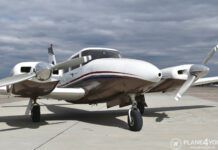A Harvard University economics professor says the U.S. should adopt Canada’s model for air traffic management to ensure private aviation pays its fair share and prioritizes airline traffic over general aviation. Jeffrey Frankel’s op-ed was published in the Toronto Globe and Mail two days before Airlines For America wrote government agencies complaining that general aviation caused airline flight delays over the holidays. Frankel takes a slightly different approach by saying the private not-for-profit contract model used by Canada will reduce the number of private aircraft by substantially raising their cost of access to the system.
“The ATC system must have incentives to prioritize commercial airlines, which are more attuned to passengers’ needs, over the interests of the private-jet lobby,” Frankel, who is also a research associate at the U.S. National Bureau of Economic Research, wrote. “Privatizing the ATC system would make it accountable to the public and would compel private-jet owners to pay their fair share. This would result in fewer takeoffs and landings, thereby reducing airport congestion.”
Nav Canada, the private company that runs the air traffic system there, charges airlines and business jet operators fees for air traffic services based on the weight of the aircraft and distance flown while under its control. According to Nav Canada’s online calculator, the operator of a Cessna Mustang light jet would pay about $100 USD in fees for a 400-mile flight from Vancouver to Calgary. Operators of most light GA aircraft (less than 4,409 pounds) pay an annual flat fee of $82.46 to cover all the ATC services they use in the year.
Frankel alleges that U.S. business jet operators are getting a free ride on the backs of airline passengers. “As it stands, the system heavily subsidizes small private jets at the expense of harried commercial passengers, who are forced to pay substantial taxes and fees,” he wrote. “Despite representing about one-sixth of the flights managed by the FAA, private jets contribute only two percent of the agency’s tax revenue.” He did not cite a source for those figures.
Frankel also says the controller shortage is a major factor in flight delays, but Nav Canada is also facing staff shortages and frequently closes airspace to VFR traffic around major centers to make way for airliners.



































“reduce the number of private aircraft by substantially raising their cost to access the system”
Wow, that’s so easy! Just getting rid of GA will fix both airlines mismanagement and government run ATC labor shortages.
If you can’t afford to fly, get a better job. Its the American way
Here’s an alternate idea based on actual fairness: make the system and users of that system respect those users of the common sky who do not need a system to safely use the sky or reimburse them in some way for the inconvenience caused by users who fly so fast they endanger everyone else in their pursuit of profiting off of the commons.
Let’s imagine our national airspace as an ocean that is legally a commons (not much of a stretch). Now, we have everyone using that ocean, which is their right, just fine by seeing and avoiding each other. Then, some businesses come along and start ferrying passengers from city to city using the commons. Then, they figure out how to make their ships travel much more quickly, but only if all the other users are kept out of their way. They and their customers then demand that all the other users should change how the commons is regulated. The other users see the benefits for so many, and a system is created that gives amenities to the other users paid for primarily by the fast ship businesses and other fast ship operators in a compromise to benefit all.
Decades later, the fast ship businesses and their customers forget the ocean is a commons and that it is the right of every citizen to have equal access. They now want to use the tyranny of mob rule to push out many of the other users using politics and propaganda and regulation.
Tell me where I’m getting this wrong.
” “Despite representing about one-sixth of the flights managed by the FAA, private jets contribute only two percent of the agency’s tax revenue.” He did not cite a source for those figures.”
Yet another opinion by a far-left “Harvard Professor.” According to its own website, “Harvard has built a community comprising many backgrounds, cultures, races, identities, life experiences, perspectives, beliefs, and values.”
Like so many “think tanks” what it DOESN’T include is common sense.
The U.S. aviation system is the envy of the world–EVERY AIRCRAFT HAS EQUAL ACCESS (and unlike so many government-run ATC systems, we DO have the option of avoiding the system!). This theoretical “Harvard Professor” would have us go to the Canadian/European model–where the access goes to the highest bidder. (Strangely enough, that is the directly OPPOSITE of most liberal tenets!)
The reference to “business jets” is a clear case of “class envy”–though business jets are far outnumbered by people using private airplanes like they do “private automobiles”–to increase productivity and provide access to remote areas NOT served by “public transportation.”
Frankel’s failure is highlighted in the last paragraph–“Frankel also says the controller shortage is a major factor in flight delays, but Nav Canada is also facing staff shortages and frequently closes airspace to GA aircraft at major centers to make way for airliners.” In other words, the failure by the government to plan and to fund the system has created yet another failure has made the problem WORSE.
Let him try to do business OUTSIDE OF THE CLOISTERED ENCLAVE OF ACADEMIA (the areas known as “THE REAL WORLD”)–he would soon shed his Utopian theories.
“Strangely enough, that is the directly OPPOSITE of most liberal tenets!” Jim, it sounds to me like the professor was paid under the table by A4A to come out with this idea, based on the shaky foundation on which he builds his case against GA. The professor’s credentials provide credibility to A4A’s outburst two days later. IMO, it all adds up to cheap and shallow lobbyist posturing with no roots in fairness, knowledge, experience, rigorous research, or balance, and has everything to do with politics.
Sorry Jim, but you read “Harvard” and knee-jerked to liberal.
In reality his position is a standard conservative economic model that butts up to a libertarian posture.
Like you, I think his proposition is ridiculous and would be nothing but harmful to aviation in the US. They can keep their privatized system in Canada.
His website states: “Harvard has built a community comprising many backgrounds, cultures, races, identities, life experiences, perspectives, beliefs, and values.”
However, Harvard does not accept Jews, Christians or conservatives.
Ummm…. You need to check your facts. I know Catholics and Jews that went to Harvard. And some very much are on the conservative side of the fence.
(Just saying because there are way to many incorrect comments on all sides these days. And we’re all just as bad if we “blame them” when our side is just as bad.)
“Frankel alleges that U.S. business jet operators are getting a free ride on the backs of airline passengers.”
Does this guy even know we all pay taxes on aircraft fuel to fund the system? Using his model we should also be paying more to drive in the US, by turning every road into a toll road in addition to the fuel taxes.
I suspect he has never held a job outside of academia.
…and does this guy even know that GA already pays more taxes per passenger than the airlines, due to their higher fuel consumption per passenger?
Bingo
I’ve been thinking the airlines are getting over on the passenger taxes and ought to pay fuel taxes.
Why is it that when academics (and politicians) consider user fees, no one considers how user fees have destroyed GA everywhere they are tried?
The one advantage of the current US model that no other country has: our airline pilots are vastly more trained and more experienced than any other country in the world. Without a robust GA industry, that will change for the worse.
Because, when these people start talking, and you ask this question, it doesn’t matter to them. The answer is: “Well [communism, socialism, massive tax increases, enter your argument here] didn’t work there because they didn’t do it right; we’ll be different, we’ll be the exception”.
I am based out of Canada. ATC (cannot use ATS: S for service – non existent) service degraded swiftly since it when private. We do not have any kind of trafic the USA experiences and yet we suffer denial of service all the time. I even get chastised on Center frequencies for requesting nimble PA-30 flight following. Making ATC private for any kind of reason is an immense hoax. Dear neighbours from the south do not even think about it, you will regret it.
Marc Arsenault
Capt A-330 (ret)
Ditto! As an aircraft owner in Canada, the ATC privatization to NavCanada was a terrible betrayal for aviation. The understanding was that we’d pay huge taxes on fuel in return for aviation services. And, airport landing fees and service fees for airport improvements. Eventually all those taxes and fees went into general revenue and now pay additional NavCanada fees on top. And like the U.S. our nav system is primarily satellite based – no VORs or ADFs are being built or serviced, so costs are way down.
It is a measure of “The Harvard Professor’s” naivete and inexperience–I’ve flown to 83 countries around the world–many of which have precisely the system for which he advocates.
Every time I come back from one of these trips through “aviation Hell” (lack of aviation infrastructure, long wait times, inexplicable “closures”–high government “handling fees” that often don’t arrive until WEEKS AFTER THE TRIP, I tell people “DON’T LET THAT HAPPEN HERE!”
The “Harvard Professor” needs to get out of academia, and experience the REAL WORLD!
I’m not sure he isn’t shooting for the results you predict in the first place.
Someone who is out of touch with reality. While the ‘class’ envy wants to point a finger at GA, GA is but a drop in the bucket, especially jets.
What these academics don’t understand is that a good part of GA is centered around flight training, which feeds crews to the airlines.
We have to look at the entire eco-system. To take one sector (airlines) in a vacuum, doesn’t account for how each affect each other.
“As it stands, the system heavily subsidizes small private jets at the expense of harried commercial passengers, who are forced to pay substantial taxes and fees,” – I suppose that the elite, clueless Harvard genius believes that if the “subsidy” of private jets were eliminated that the “harried commercial passengers” would then receive a discount. Suuurrrre!
Didn’t you start getting that discounted rate when you started checking out yourself at the store? I didn’t see it in my area, but I keep hearing from professors and others in think-tanks that yes, those discounts occurred for some people (I have just never found those people).
Europe based so we have had ‘user fees’ for the longest time. Not cheap – for anything over 2000kg MTOW (4400lbs) it starts at about $60 per hour of flying and goes up with increasing weight. A few years ago we had a Cessna 340 in a group of 6 that rocked up an annual Eurocontrol bill of $10000 or thereabouts. Ouch….
Be careful what you wish for…..
This prof really has to step out of the Ivory Tower and join the real world.
He is advocating for the same NAV CANADA that:
– on XMas Eve canceled all departures from YVR from 2100 to 2300 due to staff shortages
– that regularly and routinely implement flow control into YVR as they can’t handle the traffic
– that can’t hold a candle to the US controllers who handle way more traffic and way busier airports
– that has a governance model that has lead to poor management for decades
I’ll take the government run FAA model any day over the disaster we have in Canada.
RV6 in Canada. I have flown quite a bit in your country. Cannot count the number of times I have bragged about how great your system is. GA in Canada is dying a slow painful death. Never let it happen!
I have that people often become rich not by being innovative or industietrious. They become rich by being so close to the money. By moving from govt control to the provate sector, we could expect costly expenses for motels, food and travel, a costly board of directors, and finally costly officers who use industry pay consultants who know how to generate repeat business. Oh, and then add probably 10% and more for profits. Oh, and then add additional difficulty having people in the private sector to be held accountable as opposed to government employees who are expected to serve our citizenry.
Commercial aviation has already taken the lion’s share of access to airspace. They get no sympathy from where I stand. As to this professor, I’d to see where his facts are coming from. I do not see business jets sitting at our largest airports in the proportions he claims.
Next, our nation’s highways we’ll closed to private users in favor of commercial transportation. The FAA needs to staff their towers and radar centers by paying their employees fairly and not burdening them with often an impossible job.
Maybe the FAA should think about making airlines increase their seating capacity and reducing the number of flights accordlingly.
Oh, please don’t encourage the airlines to increase the seating capacity on the airliners any more than they already have! If they decrease seat size and spacing any more than what they already have, I think that many people will be unable to get out in an emergency. In non-emergency situations it will just further increase passenger incivility.
He’s referring to using larger planes on more routes, I believe. The airlines found frequent passengers will often choose the carrier who has the most flights on a route and the incentives thus are for more small planes rather than fewer, larger planes.
Interesting coincidence that this editorial coincided so closely with the Airlines for America letter. Ya reckon that perhaps the professor is a paid consultant for them?
I thought the same thing. A bit of a coincidence here? If multiple for-profit companies did something like that it would be considered collusion or price-fixing. Get the academics on-board a “group” like A4A and it is okay somehow.
I’ll bet he is!
A while back we caught a Rice prof taking money from the mayor of Houston to change the results on a study on traffic cam safety. It didn’t cost much extra to get the study results changed to support the cameras rather than expose the danger they cause.
The esteemed professor reminds me of the Malcolm Muggeridge quote “… having educated themselves into imbecility…”
So right You’re, jsisk 140359!
A more credible progressive point of view from this nice Harvard man, if he was serous about a solution for mass transit, would be to reinforce the case for high speed rail. There are several corridors in the USA where high speed rail would be as fast as (or faster) and cheaper door-to-door vs the PITA that is domestic airline travel today. The airlines have strangled AMTRAK and done their best to stifle progress of high speed rail even at a state level in the USA. Now the same airlines are gunning for GA. Will watch this issue carefully come November.
You son’t want the system we have in the UK, where light GA is excluded from International airports and discouraged at several other airports. Landing fees are high and one approach can cost $50, even if it using a pilot-interpreted aid.
Piston GA is virtually excluded from many of the largest international airports in the US already, and I don’t think anyone really cares. The grumbling happens when people get chased out of reliever fields or those fields get closed to please politicians and developers.
Frankel’s proposal is the opposite of “leftist.” Leftists support collective ownership (or regulation) of shared infrastructure on the grounds that private ownership will let those with resources purchase better service at the expense of others with fewer resources (leading to an unfair allocation of a resource to which all citizens should have access). Conservatives support privatization of government activity most often on the grounds that free markets are more efficient.
BTW, I am a GA pilot and airplane owner and I do NOT support Frankel’s proposal. But, condemning his idea because he is an academic, or a leftist, or at Harvard, or woke, or anything else other than the actual impact it would have on our ability to fly our airplanes is all about the political tribe of the commenter and not about policy.
“Frankel’s proposal is the opposite of “leftist.” Leftists support collective ownership (or regulation) of shared infrastructure on the grounds that private ownership will let those with resources purchase better service at the expense of others with fewer resources (leading to an unfair allocation of a resource to which all citizens should have access).”
Does Frankel’s proposal NOT call for collective ownership (regulation) of shared infrastructure (the infrastructure of Air Traffic Control?)
Does Frankel NOT advocate favoring the “high bidder” (the “for-profit airlines”) assume control of a “first come, first served” system paid for by ALL taxpayers?
“Conservatives support privatization of government activity most often on the grounds that free markets are more efficient.” That’s true–as far as it went–free markets usually ARE more efficient. That argument falls apart, however, when government control of a finite resource (whether precious ATC time, or occupying runway real estate) is involved. As others have pointed out, “Selling to the highest bidder” should not apply to a government-funded activity–but that is EXACTLY what Frankel is advocating. One must wonder what ELSE he is willing to sell? “Naming rights to National Parks? (or to continue with the topic being discussed, “slot times” for access to the highest bidder for National Park entry?)
No, leftists tend to believe that “government knows best”–yet government control (“for your own good”) around the world has shown that to rarely be true. I’ve flown to 83 countries around the world–NONE of them compare to the U.S. when it comes to freedom to fly–and THAT is the basis of Frankel’s “pay to play” slot allocation at the few airports where airlines have delays due to their own scheduling ineptitude.
Most people with experience in the aviation business tend to advocate for minimal government intervention. One wonders if Frankel has any knowledge of the industry that he is trying to regulate?
Well put. Privatized ATC is the worst sort of privatization. It’s crony capitalism or socialism. It’s not driven by a desire for more competition and choice to create efficiency and value. It’s simply a free lunch scheme to hide government ineptitude so it hopefully won’t be noticed how badly the politicians and bureaucrats are at governing.
Conservatives in other countries might go along because conservatives in many countries are not free market supporters in the American conservative tradition as we know it.
Right and Left don’t have much meaning here either.
One little detail that isn’t accurate in the Professor’s article is that when NavCanada is experiencing controller absences or other staffing shortages the only GA aircraft impacted are typically VFR/piston powered…the biz jet crowd always has access to the major centres…I operate beneath the extended TCA for CYYZ and many is the number of times that I have been denied flight following or access to the Class C airspace.
I don’t feel compelled to access the large centre of Toronto regardless; the real issue is that the denial of services from the ACC extends to IFR training, which given the current state of aviation is not acceptable at all.
There is a fundamental flaw in the argument that GA doesn’t “pay its share”. The ATC system isn’t structured around the number of operations, but rather around the number of seats. (Hence the old adage that the FAA is the “Tombstone Agency”.) In my state and two of those around me, the busiest airports are not the ones with the Class-B or Class-C airspace… those one the ones with the AIRLINE and MILITARY traffic. The busiest airport in the state of Maine doesn’t even have a Class-E surface area, whereas there are two Class-C airports in the state.
With the airlines consuming more services than GA, it stands to reason that they should pay a higher percentage than GA. Just my two cents.
Those that can “do”, those that can’t “lecture.” He does not cite a source for his figures and coming from Harvard, where even a plagiarizing president gets a free pass, that it not too surprising. At the end of the day, the US has a system that works and his “it’s for the masses” mantra smacks of nothing more than thinly disguised socialism.
“Squeeze out.” Is that what the guy said, Russ?
I’ve long felt the U.S. ATC system should be outside the FAA.
If light airplane pilots in Canada pay less than $90 a year, that doesn’t seem exactly like a squeeze.
It will when the only airport near your destination is squeezing you out or squeezing you for landing fees and parking fees while causing you to burn a lot of extra fuel because you are treated like a third class citizen.
People,
Many of you have offered strong arguments against Jeff Frankel’s proposal. That’s good.
Many of you have also offered speculative character assassination, assigned derogatory stereotypes, promoted guilt by association, and so on. That’s bad.
Knock it off.
Jeff Frankel is a friend of mine of more than 50 years.
I disagree with lots of my friends on lots of topics. This is one of those times.
If you want to convince Jeff, or any onlooker, of the quality of your arguments, you’d do well to focus on the issues and not on personal bile.
I appreciate that writer R100RS offered similar comments.
Demonstrably bad ideas from so-called experts deserves rounds of laughter.
No need to argue the topic itself since, unlike Jeff, already know the bad it does when it has been implemented elsewhere.
What is really sad is a so called “Prof” give an opinion about a matter he doesn’t understand at all, as is easily acheived if we have read what he had written. “Prof” of what? Economics? Infrastructures management? Social transport?
Exactly! And I don’t care a little bit of those that are are friends of him. In the 30ths of the last century, Adolf Hitler had also a lot of “friends” and, before, the same happened with Karl Marx and Lenin.
I agree. Often the friends of those mentioned could be counted upon to do the dirty work.
I see we achieved Godwin’s Law at 1:55pm. Something about Harvard that really brings out the tribalism.
Does Jeff actually ask any pilots about how things actually operate now before writing his opinions?
Privatization only works where competition exists or can exist to protect consumers. ATC is a monopoly so whether or not it is government run it has to be government regulated.
The discussion is really about how to fund the activity, through user fees and/or fuel taxes, and access, only for deep pocket commercial operators or individuals/GA. Privatization is immaterial to both of these.
I suggest we privatize Harvard’s windfall gained from taxpayer-backed college loans. Go back to how things were, all students pay their own way. These overpaid, under-worked, ivory-tower residents would soon be tossed on the street.
100%
Perhaps we can squeeze out schools who test for intelligent students and then take credit for graduating intelligent students after teaching them a lot of questionable nonsense of little value.
Follow the money. How much and from whom is he getting paid?
A4A?
Suspicious coming on the heels of the A4A letter to the FAA. Methinks I smell a rat?
OK, Professor Smartypants, how’s about THIS notion then … the roads become privatized and you have to pay for every mile you drive. OH … wait … some States already want to do that. OK … how’s about privatizing the schools and forcing everyone to either use them or pay their own way. OH … wait … they already did that, too. 🙁
Harvard has now had IT’s “Bud Light” moment … this guy is merely the most recent face of it.
Don’t forget that Donald Trump was hell-bent on privatizing ATC prior to and upon being elected to POTUS.
That just means that bad ideas can come from anywhere. Good ideas, too (just not in this case.)
Yeah, cuz he’s a genius. Just ask him. Privatizing GA always sounds smart, but it actually accomplishes little worthwhile. It just hides the failure of previous management.
YEAH! Economics Professor. Maybe you should try flying a small airplane in Canada….or maybe you should just try flying a small airplane!
So, Mr. Economics Professor, a bunch of us remember when the “Bean-Counters” – your students – took over Boeing. Look what happened then! We have our problems in General Aviation, but history has taught us not to listen to “experts” who lack any common sense as we work towards our own solutions. From your myopic window on the world, it’s just some numbers. We face challenges daily that often turn life-threatening.
The fact that you consider General Aviation less important than the airlines is not a political statement. It is a demonstration of your own naivety. Of course, Canada does not use crop dusters on their timber forests; does not have a large enough industry and business structure to require independent private transportation; does not support a large and competitive aircraft manufacturing industry (Bombardier….ehh, isn’t that still government supported?) that employs hundreds of its citizens; does not foster the pilot recruiting, training, and experience preparation for airline service that GA provides here; does not provide private (not government supported) pipeline and power transmission inspection flights; does not provide private (non-Provincial government) air rescue and ambulance service; and must use Part 121 based airline service to provide life essentials to the northern settlements (“Ice Pilots”). In short, Canada has demonstrated their attitude towards General Aviation and is paying the price. I suggest that Canada’s mistakes should stay in Canada and perhaps they will let you join them.
OK, here’s a thought: I think the issue isn’t “privatization”, but more efficient use of the airspace. I’m for suggesting (again) the idea of increased stratification and sectorization of the NAS.
A simple model could be surface to 10K, 11K through 29K, then the rest goes to the RVSM capable operators. Add to that the “cutouts” for Class B operations high rates of climb, and fuel-efficient descents — and “bingo”, we’ve got the foundation where most operators will be “happy.”
Yes, this would require cleaning-up those Class E surface extensions, but in this era of “A/I”, that shouldn’t cause much consternation.
“Seven Days in May”, or maybe December. Bring in the expert witnesses. Enter the professor. Music Maestro!
Show me the content of my post that “requires moderation.”
I think a major sticking point for the airlines is lost revenue – even though they were bailed out by Uncle Sam – that resulted from the pandemic pax surge to chartered flights. It’s no secret that first/business class travelers abandoned the airlines for part 135 (10 or more) travel. The Gulfstream and Bombardier on-demand community ballooned in the last 36 months and the clientele that drove it are sticking with it.
Harvard Economist, tells it all.
“Privatizing the ATC system would make it accountable to the public.” How in the world does that happen? It seems that every tie the government privatizes something, the complaint goes up about loss of accountability. This would also, in my opinion, mean privatizing an inherently governmental function: regulation of interstate commerce. That may not be true in Canada, but it is in our own constitution.
“Nav Canada…frequently closes airspace to VFR traffic around major centers to make way for airliners.” Does this mean VFR traffic that is NOT using ATC services? How far out from the “major center” is “around”? Does he mean GA airports within a certain distance of the major airport, like everything in the Mode C veil? Class E airspace even in VFR? If he means VFR flight following, then we do that here, too. Flight following is only available when ATC workload permits. VFR in general does not burden the ATC system and, as pointed out by others, VFR in general and most GA traffic, including Bizjets, avoid major airports — and congestion to and from those airports at peak times is where the problem is.
That is just a couple of the problems with this report. Many have been addressed by others in this thread. This article makes the OpEd (which I admit I have not yet read) seem like a solution in search of a problem.
The United States has the best air traffic system in the world. Ask anyone who has ever flown anywhere else, whether they are ATPs of VFR private pilots. Don’t mess with a system that works.
Professor Frankel has forgotten that commercial carrier (truck/air/ship) costs are paid by the consumer not the commercial operator (air carrier/ trucking/vessel) through price of goods or service offered. As a Harvard Professor he should know that. Since private/personal pay less user fees, registration, fuel, and taxes than commercial – following this reasoning:
– Commercial road vehicles before private/personal on interstates, state and county highways and your community streets,
– Commercial vessels before private/personal on rivers, lakes, and coastal waterways, and
– Commercial pedestrians before private/personal on sidewalks and parks.
After looking into Jeffrey A. Frankel’s background and reading his opinion piece, I’m worried that he might not fully grasp the role of General Aviation (GA), possibly influenced by A4A plans. He seems to be focusing on operational coordination and efficient air traffic management, but his views also suggest creating user fees or increasing already established taxes for General Aviation. We have been through this before. Not our first rodeo.
From my POV as an old CFI. This raises concerns about potential unintended consequences for flight schools and pilot training programs, which serve as crucial entry points for individuals pursuing careers in commercial aviation. If enrollment in these training programs declines, it could worsen the existing pilot shortage in the airline industry. This decline not only affects the availability of pilots but also has broader implications for the aviation sector.
The worry extends to the downstream impacts on various aspects of aviation, such as decreased demand for airframes, propellers, engines, avionics, maintenance technicians, and even Air Traffic Controllers. Essentially, a decrease in new entrants to aviation could create a ripple effect, negatively impacting different components of the industry. GA and all things connected are in a fragil state.
when has the greater good ever stopped corporations?
Is anyone else sick of these Harvard know-it-alls? I think they should stay in their ivory tower and let us little people who do the work run the world.
Dr. Jeffrey Frankel, recognized for his research in airline economics, has recently shifted his focus to scrutinize operational challenges in the aviation sector, as evidenced in his 2023 op-ed, “Why America’s Air Travel is Suffering.” This evolution positions him as a potentially well-informed analyst and a credible source, supported by a substantial body of work that includes:
1. 1994: “Airline Pricing in Deregulated Markets” (co-authored)
2. 1997: “Airline Deregulation and Public Policy Options” (co-authored)
3. 2011: “Air Traffic Control: A Global Public Good?” in The Role of Public Goods in the Global Economy
4. 2017: “Airport Congestion: Can Technology Fix It?”
5. 2018: “Airport Delays: An Airline Scheduling Problem?” and
6. 2023: “Why America’s Air Travel is Suffering”
It seems like Dr. Frankel’s publications are intended to urge policymakers to tackle systemic inefficiencies, emphasizing the need to prioritize safety and reliability in the national airspace, at the expense of General Aviation. Given his analytical and scholarly expertise, he stands as an ideal candidate for consideration by A4A as a congressional expert. Consequently, before GA is thrown under the bus, it is crucial for us to respond intelligently and convincingly, ensuring counterpoints are practical and aligned with the overall well-being of General Aviation.
With all the “good press,” that Harvard has had recently, why not put out something that’s sure to piss off a bunch of people?
Why do I get the feeling that the commentariat is silently clamoring: Can’t we all just get along? And that the professor should be granted a flight training scholarship. Show him the ropes. Sway him into General Aviation with a promise that we would all go to cheer him during his first solo flight. What do you mean by “he’ll probably get a hundred on his FAA Knowledge Test, but can’t fly worth a sh*t? “You get more flies with honey than with vinegar.”
Oddly enough, I think that’s the best idea yet. We have lots of organizations who give “scholarships” for flight training these days; have one of them “scholarship” his butt. (sideline – does anyone pay for their own training anymore?)
Most “scholarly output” is burdened by a lack of actual knowledge or experience that’s actually germane to the question the paper attempts to address. It’s the same in virtually any industry or pursuit. My background is in transportation which is a favorite among academics as it gives them the patina of knowledge of the common man. I suppose talking to one truck driver is better than talking to none. Most academic writing is done from the idea of building upon existing “work.” It’s much easier for committees to approve writings that purport to be based on previously “peer reviewed” papers than to deal with actual research. But it’s garbage in garbage out and no one at the University will ever know since they don’t have the exposure. So let’s help this guy expose himself – wait – that’s not what I meant. But getting him flying would be a good idea. Maybe we could do that with Secretary Pete too…. Just an idea…
He’s from Harvard so lack of reality IS expected. Aviation needs his advice like a hole in the head.
Before the good professor starts trying to “fix” our ATC system by switching to the Canadian model, he might want to talk to the people who actually USE the system as opposed to the people who RUN the system. Several Canadian pilots have commented here, and none had much good to say about their system. Likewise, pilots who have flown in Europe have reported how costly, but marginally operational, their systems are. Even Transport Canada will admit that they have the problem of maintaining an adequate staff of controllers. Plus, their system struggles to function while handling a fraction of what the American ATC system does on a daily basis. Both Prof. Frankel and the A4A letter conveniently overlook the root problem with the American ATC system. Our problem is a Congress that is too busy fighting with each other to sit down and pass a rational funding bill for the FAA. We all agree that the FAA and its ATC network are in serious need of upgrading and improved training and staffing of controllers. But, none of that is going to happen until Congress appropriates the money to make it happen. Changing to a private/public operation isn’t going to solve the problem, because Congress will still want oversight on the system. If anyone thinks that such an arrangement would work, I suggest you look at another private/public operation called the US Postal System.
The National Air Space is an example of a tragedy of the commons. As such, its operation is more akin to Mercantilism than to a free market. It is managed to achieve politically determined goals, as opposed to by profit motive which requires happy customers. Those goals are typically set by those with the best lobbyists, definitely not the pilot flying a Piper Cub. Some users will always try to monopolize the common resource and have the costs born by others.
The system we have works amazingly well at managing the shared National Air Space. Let’s not throw the baby out with the bath water.
There seems to be no limit to the evil ideas those at Harvard can come up with. A rotten collection of leftists with extreme ideas that are always negative. It’s good their agenda is being exposed more and more.